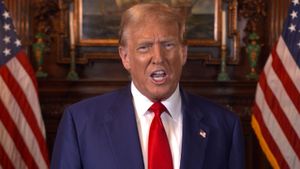On January 26, 2025, Alexander Lukashenko, often referred to as the last dictator of Europe, sought re-election as President of Belarus for the seventh time, amid widespread condemnation of the electoral process as little more than a facade. The election followed the routine pattern established during his more than 30 years of rule, and critics both within and outside Belarus expressed disbelief at the legitimacy of the proceedings.
From the onset, it was apparent the election was not going to be a fair contest. More than 1,200 political prisoners languished in Belarusian jails, reflecting the hostile environment for dissenting voices. Sweeping repressions characterized the lead-up to the election, and those who dared to oppose Lukashenko found themselves either imprisoned or exiled. Unlike previous elections, this time around, there were only candidates aligned with Lukashenko's regime, hampering any idea of democracy.
The early voting phase commenced on January 21, with authorities reporting significant participation, but many analysts argue these numbers were manipulated to create the illusion of legitimacy. Skeptics, including EU foreign policy chief Kaja Kallas, called the election a "sham" and labeled it an "affront against democracy", pointing out the absence of genuine opposition candidates.
Lukashenko openly dismissed concerns over international recognition of the election results, stating, "I did not want to run for this election," thereby attempting to cast himself as reluctant yet determined to see through another contest. His perceived dirge for democratic ideals seemed almost laughable considering his long history of crackdowns against dissent, particularly after the massive protests ignited by the 2020 elections, where he faced significant opposition from candidates like Svetlana Tikhanovskaya, his most notable challenger.
While some voters from Belarus's almost 6.9 million-strong electorate flocked to the polls, the political atmosphere was undeniably bleak. Voter participation had historically been manipulated to serve the regime's ends, and many citizens remained skeptical, reflecting on the upheaval from the last election. Observers note it was during the summer of 2020 when Lukashenko falsely claimed victory with over 80% of the votes, sparking nationwide protests.
“This election is merely a farce,” said several opposition figures residing abroad, continuing to echo sentiments of hopelessness felt by many Belarusians who dare not voice their dissent. The current geopolitical realities intensify the oppressive situation with Belarus increasingly becoming subservient to Russian interests. Analysts warn of the deepened ties between Lukashenko and the Kremlin, especially considering Russia's support during the turbulent days following 2020's disputed election.
Currently, the Belarusian regime appears to have drawn some support from the war in Ukraine, as public sentiment has shifted to perceive Lukashenko as a stabilizing force against perceived external threats. During his prolonged reign, Lukashenko has portrayed himself almost paradoxically as both dependent on and independent of Russia, attempting to balance local sentiment with the necessities of his authoritarian governance.
Top government officials continue to propagate the narrative of external danger, painting opposition movements as threats to national stability. The Ministry of Internal Affairs warned of ''threats from abroad,'' justifying their ruthless crackdown on human rights. This pattern of narrative is not new; it mirrors how authoritarian regimes function, manipulating public perception to maintain control.
The extent of repression culminates with constant surveillance, restricted access to independent media, and arbitrary arrests of regime critics. The Lukashenko administration has unlawfully claimed to address violent protests as justifications for widespread abuses against human rights, which includes torture and systemic oppression against any organized dissent.
Despite the bleak outlook, underlying forces for change still simmer among Belarusian citizens. Young people express desires for personal liberties and freedoms, displaying resilience against their repressive reality. Nadezhda, a 23-year-old Belarusian, states, “The Belarusian youth is reflective. We want to engage with the world and question the status quo.” Such sentiments suggest there may be entities ready to challenge Lukashenko’s authority eventually.
With Russia's unwavering support, Lukashenko might cling to power longer than many expect. Yet, his reign is mired by the realities of dissidence brewing among the populace, even as the state heavily monitors dissenters. Observers are skeptical about the nation's future, aware of the lessons learned from years of dictatorship under Lukashenko, which suggests no easy path toward liberation.
On the international front, Lukashenko appears indifferent to criticisms and sanctions imposed by the West, which has characterized Belarus's government as illegitimate. Should the upcoming elections yield results aligning with his regime's interests, the immediate consequences will center around how Belarus remains integrated within the existing geopolitical frameworks dominated by Russia.
Regardless of the election result, Lukashenko’s hold appears more like oppression than governance. For those seeking reform and democratic processes, the scope of civil society jolts against the apparatus of repression indicative of Lukashenko’s regime continues to shape Belarus's tumultuous political narrative.



